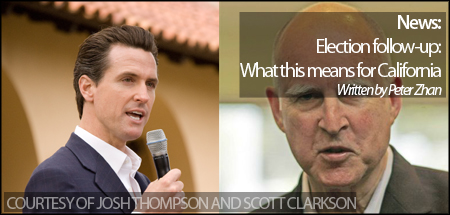
While a large portion of the country went red on election day, California represented a decisive win for Democrats, with both gubernatorial candidate Jerry Brown and senatorial candidate Barbara Boxer winning their respective positions. Along with these wins, Democrat San Francisco Mayor Gavin Newsom won the position of Lieutenant Governor, and Debra Bowen was re-elected as Secretary of State.
Sarah Hosokawa, who voted in the recent election, explains, “Generally, I think people are frustrated with the economy, exemplified by the new Republican control of the House and significant Republican gains in the Senate. I also think that some people are frustrated with Obama, since his current approval ratings are pretty low. Despite this, it seems that the Democratic Party still has the stronger voter base in California.”
As the new governor, Jerry Brown will have to deal with the largest budget deficit of the country. As reported by the Center on Budgets and Policy Priorities, in 2009, California had a budget shortfall of $13.8 billion, or 13.6 percent of the state’s general fund for that year.
According to a recent Sacramento Bee report, Jerry Brown has stated that he will release a new budget plan that, instead of building off of the previous year’s budget, will start from scratch, requiring force programs to account for their spending and finances.
Equally interesting were the results of numerous ballot measures that were incorporated in this year’s election. According to the November 2, 2010 Voter Guide, Proposition 19, which would have legalized the possession, cultivation, and transportation of marijuana for adults over the age of 21, failed with 53.9 percent of voters voting no.
Hosokawa says, “I voted no on Proposition 19 for a few reasons. I felt that the proposition had some major loopholes. Like we learned in AP Government class, the proposition would [make it difficult to fire] workers who are stoned on the job; I don’t think that’s safe. Also, I don’t really want marijuana to become easier to get.” Other opponents of Proposition 19 cited law enforcement’s inability to stop drivers, including bus drivers, from using marijuana right before driving.
Proponents of Proposition 19 contended that the provision would have saved taxpayer dollars by alleviating the state’s law enforcement, and brought in revenue from taxes on marijuana.
Hosokawa stated, “I think that high school and college students have very different views on marijuana than older adults, who may be more conservative. However, I think it’s more about knowing the details about the law. I have a feeling many non-seniors who didn’t learn about the proposition in class might have changed their views if they knew some of the shortcomings of the writing.”
The less advertised Measure O, which passed with 61 percent favorable votes, increases local property owners’ taxes by $5 to issue $186 million in bonds to provide SMUHSD schools with updated classrooms and labs for core classes and to support academic programs at local schools. “I voted yes on Measure O, since I’m always for giving more money to schools,” said senior Jessia Hoffman. “I definitely care about our schools, so I voted yes on Measure O,” Hosokawa agreed.
Other notable propositions this election were Propositions 23, 25, and 26. Proposition 23, which did not pass, would have suspended air pollution control law AB 32, which requires major polluters to reduce and report greenhouse gas emissions, until the unemployment rate drops below 5.5 percent for a complete year.
Proposition 25 and 26 both passed; collectively, they are intended to have legislators create a more balanced budget. Proposition 25 makes passing budget-related legislation easier, changing the legislative vote requirement to pass budget-related legislation from a two-thirds to a simple majority while retaining a two-thirds vote requirement for taxes.
Proposition 26 broadens the definition of taxes to include some other fees and charges; this means that more proposals to increase state revenues would require approval by a two-thirds majority of each house of the Legislature or by voters this will not make passing legislation any easier, but will ensure that the taxes passed are fair.
Although the mid-term elections may be over, the problems that persist in California are far from solved.
It remains to be seen whether our decisions on the ballot measures have been wise or whether Brown’s experience and plans for the future will create substantive changes to California.




